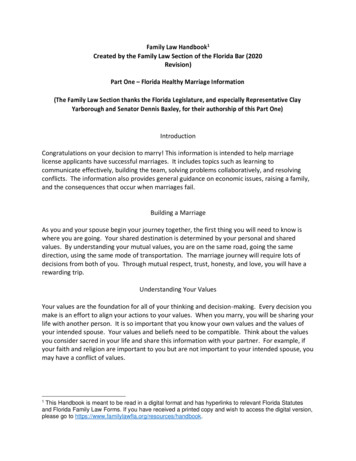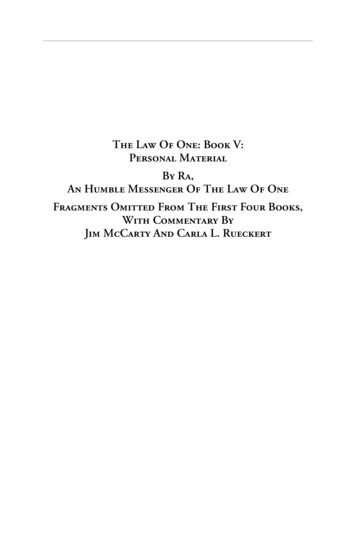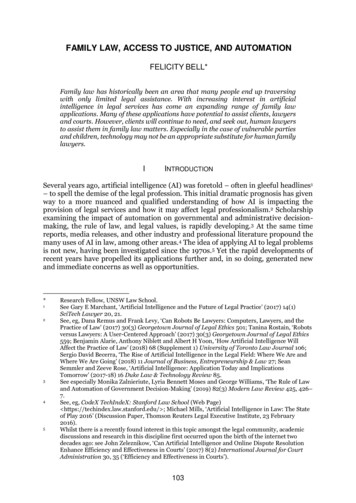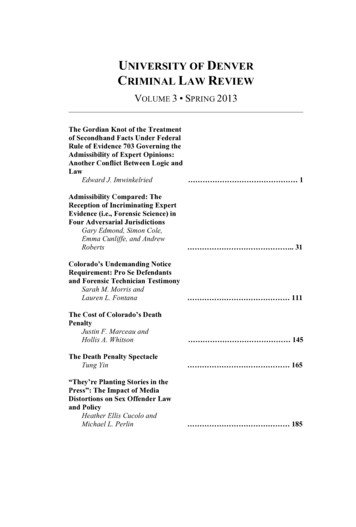
Transcription
Family Law Handbook 1Created by the Family Law Section of the Florida Bar (2020Revision)Part One – Florida Healthy Marriage Information(The Family Law Section thanks the Florida Legislature, and especially Representative ClayYarborough and Senator Dennis Baxley, for their authorship of this Part One)IntroductionCongratulations on your decision to marry! This information is intended to help marriagelicense applicants have successful marriages. It includes topics such as learning tocommunicate effectively, building the team, solving problems collaboratively, and resolvingconflicts. The information also provides general guidance on economic issues, raising a family,and the consequences that occur when marriages fail.Building a MarriageAs you and your spouse begin your journey together, the first thing you will need to know iswhere you are going. Your shared destination is determined by your personal and sharedvalues. By understanding your mutual values, you are on the same road, going the samedirection, using the same mode of transportation. The marriage journey will require lots ofdecisions from both of you. Through mutual respect, trust, honesty, and love, you will have arewarding trip.Understanding Your ValuesYour values are the foundation for all of your thinking and decision-making. Every decision youmake is an effort to align your actions to your values. When you marry, you will be sharing yourlife with another person. It is so important that you know your own values and the values ofyour intended spouse. Your values and beliefs need to be compatible. Think about the valuesyou consider sacred in your life and share this information with your partner. For example, ifyour faith and religion are important to you but are not important to your intended spouse, youmay have a conflict of values.1This Handbook is meant to be read in a digital format and has hyperlinks to relevant Florida Statutesand Florida Family Law Forms. If you have received a printed copy and wish to access the digital version,please go to https://www.familylawfla.org/resources/handbook.
Discuss these issues prior to making a marriage commitment. Build upon your mutual ideals. Aharmonious, lasting marriage will be built upon a foundation of shared values and the effectivecommunication of these values.Building Your TeamMarriage is a team effort. One of the definitions of the word team is “a group of personspulling together.” Pulling together and sharing the same goals are crucial to an effective team.Team members usually have different roles and different tasks to perform, but they share thecommitment to the team and the responsibility for the success of the team. Talking to eachother and sharing in decisions that affect both team members is very important. Talking,listening, and valuing your partner’s ideas and contributions will make your marriage teamstrong and healthy.Learning Effective CommunicationLearning to communicate effectively requires commitment from both you and your partner. Ittakes time and LOTS of energy, but it is worth the effort. To commune literally means “to put incommon; to share.” The goal of effective communication is to create a common understandingwith your partner. This common understanding is the cement of a strong marriage. Honesty isan essential component of effective communication. However, honesty must be temperedwith kindness. Good communication between both of you promotes mutual trust and respect.There are two basic forms of communication, verbal and non-verbal. Verbal includes thespoken or written word and non-verbal refers to body language. Often HOW something is said,including one’s tone of voice, facial expression, and gestures, is more important than WHAT issaid. Even what is NOT said can have a dramatic effect. For example, walking out or refusing tocommunicate can be very damaging to a relationship. When couples gain confidence incommunication, they are better able to avoid habits of withdrawal and succeed in tackling keyissues.Communication has two parts. One is speaking, the other is listening. Couples who learn howto do this calmly and effectively learn how to protect their love from the predictable problemsthat exist in every marriage. The goal is to learn to listen in a way that shows your partner youlove them. This includes listening without interrupting, giving your partner your full attention,and listening so carefully that you can show them you understand their point of view. Speakingeffectively takes just as much care as listening. Try to speak in a way that shows your partnerthat you love them, respect them, and that you want to work as a team. When you arediscussing a heated topic, try to speak in short sentences and stick to the issue being discussed.Successful marriages depend on good communication between both partners. Learning to be agood communicator takes patience and practice.
Resolving ConflictsAnother step in building a lasting marriage is learning to examine and confront issueseffectively. Couples in the healthiest marriages experience conflicts. Conflicts are normalbecause you and your partner have different beliefs and opinions. Conflict is simply a clashbetween these beliefs and opinions. The cause of conflict is that you and your partner see andapproach situations and events differently. Conflict results when there are opposite points ofview and each person believes that their viewpoint is right, and their partner’s viewpoint iswrong. The result is two different interpretations.People in conflict are seldom upset about what they think they are upset about. One eventmay trigger an emotional outburst. The outburst often is caused by a series of unresolvedissues. A win/lose situation will not solve the problem. Resolving conflicts effectively strives toachieve a win/win solution for both of you. How can you find an answer that benefits you andyour partner? The first step is for the two of you to step out of the battle and look beyond theevent that created the conflict. The next step is to shift your focus to your common interests,mutual values, and positive qualities. Each of you might want to silently ask yourself: “How do Iwant to respond to this conflict?” And, “What kind of experience do I want this to be? Do Iwant a positive experience or a negative experience?”Refocusing your own thinking helps to calm emotions. You can redirect your thinking -- andyour partner’s -- to what you both really want: an activity or mutual goal, something moresatisfying than the conflict. Couples can change their conflict experiences by changing theirthoughts about the situation.Keeping the Marriage VitalWhen you first get married, usually everything is new and exciting. But how do you keep yourmarriage new and exciting year after year? You have started a lifelong journey together. Thisjourney will have many stops along the way. Each of your destinations will bring maturity toyour relationship and to each of you. Your affection for each other increases through thelessons that you learn together and the laughter and the tears that you share. It is a goodjourney! The key to a successful marriage is having mutual values, goals, and interests; lovingand living; and, living and loving together. Couples who can laugh together under challengingcircumstances and gain the understanding of true friendship keep their marriage vital.Addressing Economic IssuesAs you prepare for your new journey as a couple, you have several financial issues to discuss.What financial resources and obligations do you bring into your marriage? Do you havebusiness debts? Will you combine your finances and have joint checking and savings accountsor maintain separate accounts? Who will pay the bills? Will you develop a budget together?Talking to each other about how you plan to earn, spend, and save your money is easier when
you agree on priorities. Your marriage benefits from forming and sticking to a spending planthat includes discussion and agreement.Sharing Financial ResponsibilitiesIt is wise to make major financial decisions together. You both will be responsible for thosedecisions. If you are uncomfortable at the thought of sharing financial responsibilities with yourintended spouse, you might want to seek premarital counseling to determine underlying issuesand to decide if marriage is the right decision for you at this time.One of you may be better at balancing a checkbook, paying the bills, and developing a budget.As you take this marital journey with your partner, talk with each other about which one of youis best suited to do specific financial tasks. Then, after you are married, try out your newsystem! Adjust it if it doesn’t work well.Here are some specific financial planning tips. Decide together:If you will maintain one joint checking account or separate individual checking accounts. Whowill pay the bills and maintain the checking account(s)? How often and how much personalallowance each of you should receive. What is an appropriate savings and investment plan?How you will pay for large purchases such as automobiles and major appliances.Building a BudgetBuilding a budget helps you to know how much income you will have, how much money youwill spend, and how much money will be left over. It helps you to control your spending. Abudget helps you to save money!What are some steps to assist you?1. Identify your financial goals: short range (e.g., buying groceries and gasoline) and longterm (e.g., buying a house, setting up a college fund for your children).2. Look at your current financial position. What is your monthly household income? Whatare your debts?3. Write out a monthly budget for 12 months. Write out monthly expenses in the differentcategories (e.g., 300 car payment, 600 rent). Estimate how much you will spend ineach category.4. Compare your budget to your financial goals. Is there money left over after meetingyour monthly obligations? If so, how much of the leftover money can be used for yourgoals? If you follow the budget you set up, how long will it take you to reach yourgoals?5. Compare your actual costs to the costs you budgeted. Was your budget realistic?6. Review and revise your budget. Stay on track toward meeting your joint financial goals.
7. Decide who will work, who will provide childcare, and who will obtain further formaleducation.8. How much insurance will be necessary?It is important to make your budget realistic and flexible. Major categories of expenses are:rent or mortgage payment; utilities; food and household goods; clothing; healthcare; insurancepremiums; tuition, charitable donations; transportation; household maintenance; credit carddebt; hobbies and entertainment; vacation and holiday savings; and other expenses, such ascosmetics, hair care, veterinary fees (if you have pets), gifts, plants, and artwork.Certain budget items are fundamental expenditures or “absolutes”, such as housing, food, andtransportation. Other budget items are less important. Hobbies, vacations, gifts, and artworkare a lower priority than shelter and food. These are “discretionary” expenditures. Prioritizeyour budget items, starting with “absolutes.”Involve your spouse in major budget decisions. Talk together about the mutual benefit andimpact of your budget decisions. For example, what should you do if one of you wants a newcomputer while the other wants new carpet, and there is money for only one of the two items?Which of the purchases is most needed and beneficial to both of you? What is the impact onthe quality of your life together if you buy the computer? The carpeting? Set your purchasingpriorities together. Be a team working towards your shared financial goals.Raising a FamilyDeciding to start a family is a BIG decision! The change you experienced when your householdbecame two, triples with the addition of a child! Children bring great joy, sleepless nights, andnew roles and responsibilities for both of you.Parenthood is a lifetime commitment. It requires emotional maturity from both partners.Raising children can be the most satisfying experience when both of you are ready to make thisunselfish commitment.Taking Responsibility for Raising ChildrenThe decision to have children needs to be mutual. Children bring an enormous change to yourrelationship with each other. Some of the spontaneity that you once had as a couple maychange. Fatigue from early childcare demands and feelings of uncertainty in your new roles cancause temporary marital stress. Career and childcare decisions, economic implications and newfinancial demands, and new housing requirements will need to be discussed. But the joys ofparenthood outweigh the tensions of change.Raising a child is a team effort and requires both partners to be active participants. You arebringing into the world a new human being who will require your full support physically,emotionally, socially, instructionally, and economically. Both of you are responsible for your
child’s care. This mutual responsibility for the care of your child or children never ends. Whenyou agreed to have a child, you signed on for life.Your successful marriage is the crucial foundation on which to build a healthy home that willnurture your children. A married two-parent household generally provides a better standardof living (more money), more time to be with children, and stronger family bonds.Coping with Family ChallengesSometimes raising children can be very difficult. You may find that you need help. Somechildren have problems making friends, getting along in school, and staying out of trouble withthe law. Family counseling can strengthen families by providing a safe place to explore issuesand resolve problems.Walking Rocky RoadsIf sad times start to outweigh happy times with your spouse, you are walking a lonely, rockyroad in your marriage. Examine your own life, your spouse’s life, and your relationship witheach other. If you and your spouse can renew your love and commitment to each other,together you can remove the obstructions in your marriage. Professional counselors and/ormembers of the clergy may help you remove some of the boulders in your marriage path.Depending on the type of problems you encounter, you may find specific support groups andcounseling classes to help you. Also refer to the phone book or online directories for listings ofcounselors, support groups, religious organizations, and other community resources.ConclusionThe provision of this information is one way the State of Florida is showing its support of yourdecision to marry. The information is intended to be a basic roadmap to guide you. The Stateof Florida hopes that you have a happy and healthy marriage! Again, Congratulations!Part Two – Family Law HandbookIt may surprise you to learn that the State of Florida has an interest in your marriage. Not in theceremony, but in whether the marriage is long lasting, happy and healthy.Because the Florida Legislature finds marriage important to the well-being of Florida and its families,it passed a series of laws to protect marriage and the family’s members when a marriage isdissolved. These laws have been passed based on the following facts and statistics:
The divorce (called “dissolution of marriage” in Florida) rate has been steadilyincreasing over time. Just as the family is the foundation of society, the marital relationship is thefoundation of the family. Consequently, strengthening marriages can only lead to strongerfamilies, children, communities, and a stronger economy. An inability to cope with stress from both internal and external sources leads to anincrease in incidents of domestic violence, child abuse, absenteeism, medical costs,learning/social deficiencies, and dissolution of marriage. Relationship skills can be learned. Once learned, relationship skills can facilitate communication between parties to amarriage and assist couples in avoiding conflict. By reducing conflict and increasing communication, stressors can be diminished. The state has a compelling interest in educating its citizens with regard to marriage and,the effects of a dissolution of marriage on the family.What does all that mean? It means that staying happily married is difficult, and requires hardwork to maintain. The struggles that couples face during their marriage sometimes causes oneor both of them to consider dissolution of their marriage. The best marriages have conflict;however, committed couples learn how to work through the rough times.The laws of Florida require that your read this handbook. This handbook is not designed to giveindividualized legal advice. It is designed to generally inform you about marriage , legal aspectsof the marital relationship, and the dissolution of the marital relationship.This handbook has been based on, and some of it has been taken directly from, Florida laws ineffect at the time it was written and represents general legal advice. Since the law is continuallychanging, some provisions in this handbook may be out of date. It is always best to consult anattorney about your legal rights and responsibilities regarding your particular case.Premarital Course and InformationMarriage and parenthood are two of the most important and most difficult jobs anyone canhave. Oddly enough, parenting requires no training or education and you do not have to pass atest to get married or become a parent. Resources are available once you become a spouse ora parent to provide support when you weather difficult times. You are urged to seek out acounselor, a trusted clergy member or other resources in your area for assistance in how tomanage and get through those difficult times. Such resources could include self-care,parenting education, handling communication difficulties and conflict resolution. Suchresources may also be available for your children as well.
If, despite your and your spouse’s best efforts, you are not able to make the marriage workand decide to proceed with a dissolution of marriage, your life will be affected in many waysyou might never have considered. For that reason, before getting married there are four mainitems you need to consider: Your commitment to each other; Yourself; Any children you may have with your spouse, whether through birth or adoption;and Your assets and debts, which include such things as: cars, money, bank accounts,retirement accounts, stock, real property, loans, mortgages, and credit card debt.The Florida Legislature requires that all persons getting married participate in a premaritalcourse or have received and reviewed information about what it means to be married from alegal perspective. The Legislature instituted this requirement because marriage is a seriouslegal action that has many consequences regarding your ownership of property, responsibilityfor debts, and your rights and responsibilities regarding the children. When people talk aboutwhat it means to be married, how they will handle things like property and debts, raisingchildren, religious beliefs, roles within their relationship, and other such issues before gettingmarried, they have a greater ability to remain married throughout their lives.You will save 25.00 on your marriage license fee if you take a premarital education course. Insome circumstances, you might have to wait three days for your marriage license to becomeeffective, if you do not take a course. If you decide not to take a premarital education coursebefore getting married, it is not too late to take a course that teaches relationship skills. Thosecourses have been known to be helpful at any time during a relationship.Child Neglect, Domestic Violence and Child AbuseChild neglect is a crime and should be treated as such. If you believe a child is the victim ofchild neglect, you should contact your local law enforcement authorities or Department ofChildren and Families.No person has a right to physically hit, push, shove, shake or abuse another person, even if thatperson is his or her spouse or child. Domestic violence and child abuse are crimes and shouldbe treated as such.IF YOU ARE THE VICTIM OF DOMESTIC VIOLENCE, or if you believe that you are imminently atrisk of becoming such a victim, you should call law enforcement at the first availableopportunity when it is safe to do so. You also have the right to go to court and file a petition on
your own behalf and/or on behalf of your children requesting an injunction for protection fromdomestic violence which may include, but is not limited to: provisions which restrain the abuserfrom further acts of abuse; direct the abuser to leave your household; prevent the abuser fromentering your residence, school, business, or place of employment; award you time-sharing ofyour minor child or children; and, direct the abuser to pay support to you and the minorchildren if the abuser has a legal obligation to do so. The court shall consider the effect ofdomestic violence on survivors/victims and children when determining time-sharing. You mayalso ask the state attorney to file a criminal complaint.You may go to family court pro se (without an attorney) to petition for an injunction to protectyourself or your child against domestic violence or sexual violence. You may retain the servicesof a Florida family law attorney to represent you in the domestic violence family action if you sochoose. You should contact the clerk of court in your local courthouse or a local domesticviolence shelter for further information.Domestic violence proceedings are public proceedings which anyone can attend. Domesticviolence court files are public records which anyone can access. In certain circumstancesportions of the court file can be sealed and kept private by a judge. Domestic violence hearingsare automatically recorded free of charge. You can request a copy of the recording after thehearing from the clerk of court in the circuit in which the hearing was held. The court willcharge a fee for a copy of the recording. You should contact the clerk of court for a current feeschedule.Marital AgreementsWhen two people marry, not only do they unify themselves socially and emotionally, buteconomically as well. In light of the State of Florida’s interest in protecting its citizens andfamilies, laws exist which dictate what will happen to, among other things, a couple’s assetsand debts should one of them die or the marital relationship be dissolved.Premarital AgreementsPersons who are considering marriage may enter into a written agreement that will predetermine certain issues between them should the marriage end in death or be dissolved by acourt. In Florida, these are called "premarital agreements." They are also known as prenuptialor antenuptial agreements. Prior to signing a premarital agreement, each party must providefull disclosure of his/her financial circumstances and condition to the other party and ensurethat he/she is not applying any undue pressure on the other party to sign the agreement.Parties to a premarital agreement may address any number of issues in the agreement such asthe rights and obligations each party will have in any property either or both of them may have
or acquire, spousal support (called "alimony" in Florida) is to be paid, if at all, and a selection ofwhich state's laws will govern the interpretation and enforcement of the agreement. This is byno means an exhaustive list of the topics. However, there are certain topics that cannot beincluded in the premarital agreement. For example, ongoing child support which cannot bewaived in Florida. If you have any questions about premarital agreements, you should consultwith a Florida family law attorney. There is even a statute specifically addressing premaritalagreements in Chapter 61 of the Florida Statutes.Post-marital AgreementsIf spouses do not execute an agreement before their marriage (premarital agreement), but arestill interested in pre-determining issues should their marriage end in death or dissolution, theycan still enter into an agreement. Marital agreements that are signed after a marriage arecalled "post-marital agreements" or “post-nuptial agreements” in Florida. The terms areinterchangeable. Post-marital agreements can address the same topics as a premaritalagreement and have the same limitations. If you have questions about post-maritalagreements, you should consult with a Florida family law attorney.Child-Related IssuesDefining ChildrenAny child born to you and your spouse during your marriage is a child of the marriage. If youand your spouse have a child together before the marriage, your marriage makes them childrenof the marriage. Unless a person has adopted a child of his or her spouse, the stepparent doesnot have parental rights or responsibilities. Therefore, a stepparent will not have a right tocontact with his or her stepchildren nor the responsibility of financially supporting the childbefore, during, or after a marriage.If a person has adopted a stepchild then that parent is the child’s parent in all respects and willbe given the same consideration as if he/she was the child’s natural born parent in the event ofthe death of the other parent or the dissolution of a marriage.Parenting PlanFlorida law requires the creation of a Parenting Plan for all children subject to a dissolution ofmarriage action. It may help parents who are separating but not dissolving their marriage toprepare one as well. There are several different types of parenting plans available to address
the unique needs of each family. The court will only approve a parenting plan that is in the bestinterests of the children.Parenting Plans are designed to reflect the modern day challenges and circumstances facingparents and minor children before, during, and after a dissolution of marriage. For example,Parenting Plans: Address the details of how the parents will share in the decision-makingresponsibilities for major decisions and for the day-to-day tasks in raising children. Articulate the regular, holiday, and break schedules for the time the children willspend with each parent. Encompass issues including the address to be used for school registration andboundary determination, and methods and technologies for communicating with thechildren.In approving a Parenting Plan, a court must make a determination of what is in the bestinterest of the child. Among the many factors to be considered by the court in determining thechild’s best interests are the following: The demonstrated capacity and disposition of each parent to facilitate andencourage a close and continuing parent-child relationship, to honor the time-sharingschedule, and to be reasonable when changes are required. The length of time the child has lived in a stable, satisfactory environment and thedesirability of maintaining continuity. The geographic viability of the Parenting Plan, with special attention paid to theneeds of school-age children and the amount of time to be spent traveling to effectuatethe Parenting Plan. The moral fitness of the parents. The mental and physical health of the parents. The child’s home, school and community record. The reasonable preference of the child, if the court deems the child to be ofsufficient intelligence, understanding, and experience to express a preference. Evidence of domestic violence, sexual violence, child abuse, child abandonment, orchild neglect, regardless of whether a prior or pending action relating to those issueshas been brought. If the court accepts evidence of prior or pending actions regardingdomestic violence, sexual violence, child abuse, child abandonment, or child neglect, thecourt must specifically acknowledge in writing that such evidence was considered whenevaluating the best interests of the child.Additionally, the court may consider other factors and considerations to be made by the courtin approving a Parenting Plan. The more closely and cooperatively the two parents can work
through the issues and consider the primary goal of doing what is in the best interest of thechildren, the easier the dissolution of marriage process will be for the entire family.The court gives both parties the same consideration in determining parental responsibility andtime-sharing, regardless of the child’s age or gender.Making Decisions Regarding the Children after Separation or a Dissolution of MarriageIn most cases, parental responsibility for a minor child will be shared by both parents so thateach retains full parental rights and responsibilities with respect to their child. Shared parentalresponsibility requires both parents discuss and collaborate on major decisions affecting thewelfare of the child, so that such decisions are determined jointly. You and your spouse mayagree, or the court may order, that one parent have the ultimate decision-making authorityover specific aspects of the child’s welfare, such as education, religion, or medical and dentalneeds. The court will determine any or all of these matters if the parties cannot agree.In very rare cases, the court can order sole parental responsibility to one parent. To do so, thecourt must determine that shared parental responsibility would be detrimental to the child. Forexample, if one of the parents has committed egregious child abuse or spouse abuse, the otherparent could be awarded sole parental responsibility. If a parent is incarcerated, the otherparent could be awarded sole parental responsibility.Parenting Time with the Children after Separation or a Dissolution of MarriageFlorida has a public policy that each minor child have frequent and continuing contact with bothparents after the parents separate or their marriage dissolves. Florida encourages both parentsto share the rights and responsibilities, and joys, of childrearing. Florida law has nopresumption for or against either parent or for or against any specific time-sharing schedulewhen developing a time-sharing schedule in the child’s
that you love them, respect them, and that you want to work as a team. When you are discussing a heated topic, try to speak in short sentences and stick to the issue being discussed. Successful marriages depend on good communication between both partners. Learni










